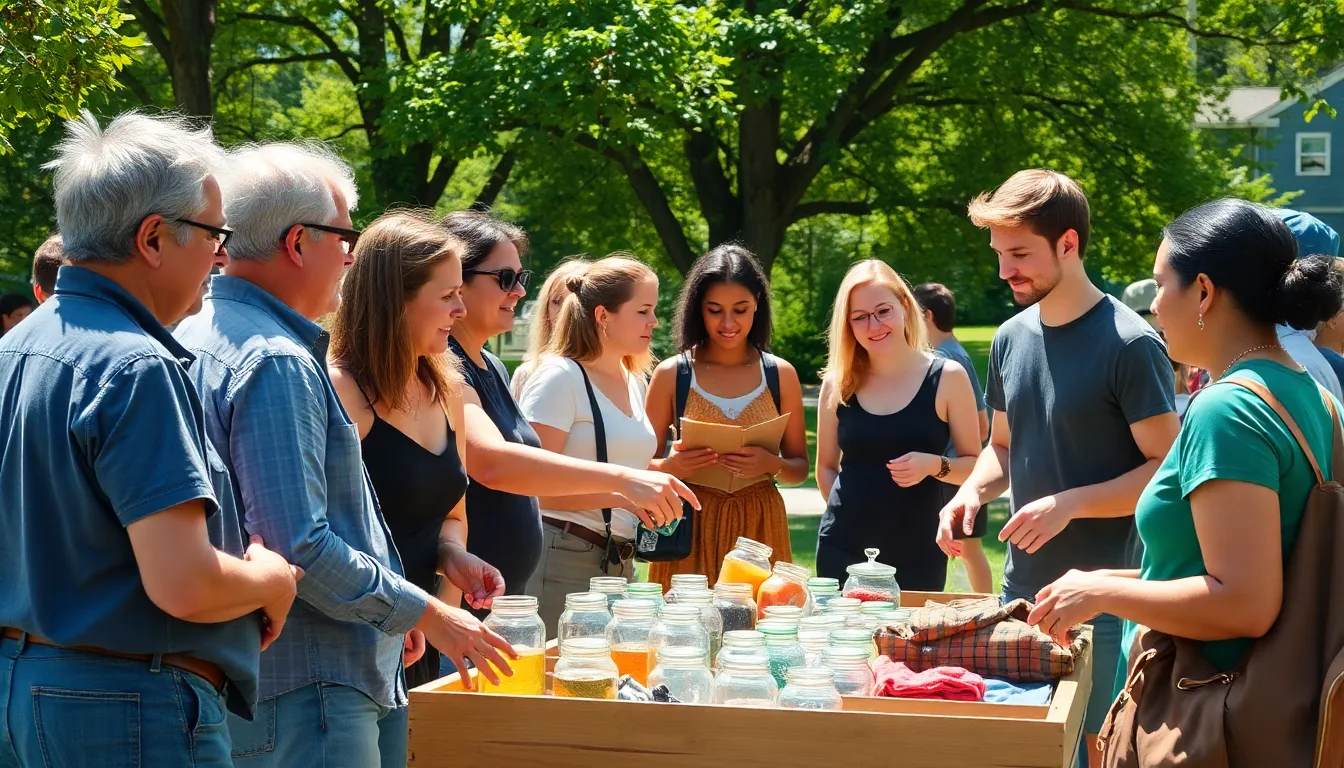Table of Contents
ToggleImagine living in a home where trash is a rare sight, and every item has a purpose. Welcome to the world of zero waste living, where sustainability meets creativity. It’s not just about saving the planet; it’s about turning your home into a hub of innovation and style. Who knew that reducing waste could be this fun?
Overview of Zero Waste Home
Zero waste home promotes a lifestyle that minimizes waste generation at every stage of consumption. Individuals adapt their habits to ensure that all products serve a purpose, either through reuse, recycling, or composting. The objective centers on creating an environmentally responsible home while enhancing creativity in daily routines.
In a zero waste home, essential practices include choosing products with minimal packaging and investing in durable goods. People often opt for bulk purchasing options to reduce plastic waste and avoid single-use items. Incorporating DIY solutions serves as an innovative way to replace conventional products with sustainable alternatives.
Composting plays a crucial role in this lifestyle, as it transforms organic waste into nutrient-rich soil. Gardeners especially benefit from composting, turning kitchen scraps into valuable resources for plant growth. Home composting systems vary in size, accommodating both small apartments and larger homes.
Moreover, embracing a zero waste philosophy extends beyond individual homes. Communities worldwide promote initiatives that encourage residents to adopt similar practices. Through workshops and educational resources, these communities foster collaboration and shared values centered on sustainability.
Transitioning towards a zero waste home often leads to financial savings, as reduced consumption lowers expenses. Many also find satisfaction in cultivating a more mindful approach to purchasing decisions. This lifestyle not only addresses environmental concerns but also enhances overall well-being by encouraging simpler living.
Principles of Zero Waste Living

Zero waste living revolves around several key principles that help minimize waste and promote sustainability in everyday life.
Reduce
Reducing consumption plays a vital role in the zero waste lifestyle. Individuals focus on purchasing only necessities, which leads to less waste generation. Choosing high-quality items that last limits the frequency of replacements, effectively cutting down waste. Awareness of product packaging also encourages selecting items with minimal or no packaging. By prioritizing experiences over material possessions, individuals can foster a sustainable mindset and enjoy life more richly. Implementing small changes, like carrying reusable bags, significantly impacts the environment.
Reuse
Reusing items extends their life cycle and reduces waste. Families might repurpose glass jars for storage instead of discarding them. Creative solutions can turn old clothing into rags or art projects. Community swaps allow people to exchange goods, promoting a culture of sharing. Prioritizing multifunctional products helps minimize clutter while maximizing utility. Using containers for meal prep reduces the need for single-use options. Embracing this principle also sparks ingenuity and inspires eco-friendly habits among individuals and communities.
Recycle
Recycling remains an essential practice in achieving a zero waste home. Properly sorting materials into correct categories enhances recycling effectiveness. Many municipalities offer curbside recycling programs, making participation easier. Education on local recycling practices empowers individuals to recycle right. Recycling not only reduces landfill waste but also conserves resources by returning materials into circulation. Responsible recycling involves checking labels, as certain items require special handling. Promoting recycling initiatives in communities fosters a culture of environmental responsibility.
Steps to Create a Zero Waste Home
Creating a zero waste home involves a series of actionable steps that minimize waste generation and foster sustainable living.
Assessing Your Waste
Start by evaluating daily waste streams. Identify common items thrown away, such as food wrappers, single-use plastics, or outdated products. Tracking this waste for one week helps highlight patterns and areas for improvement. Understanding waste types allows for developing effective strategies. Prioritize categories for reduction, focusing first on the highest volume waste sources. Utilize tools like waste audits, which provide insight into what can be recycled, composted, or repurposed. This assessment lays the groundwork for meaningful changes and enables actionable insights for minimizing waste.
Setting Sustainable Goals
Establish specific, measurable, achievable, relevant, and time-bound (SMART) goals for reducing waste. Start small by aiming to cut back on single-use plastics within a month. Gradually increase targets, like committing to sourcing all groceries in reusable bags or designing a composting system before the year ends. Engaging family members or housemates helps cultivate accountability and shared responsibility. Setting a timeline creates focus, ensuring consistent progress. Regularly review and adapt goals as necessary, celebrating achievements to maintain motivation. Prioritizing sustainability fosters a commitment that benefits both the home and the environment.
Essential Products for a Zero Waste Home
A zero waste home relies on specific products that minimize waste at every turn. Incorporating these essentials can lead to a more sustainable lifestyle while adding practicality and aesthetics to living spaces.
Kitchen Essentials
Using reusable bags and containers in the kitchen is pivotal for reducing waste. Invest in glass or stainless steel containers to store leftovers. Beeswax wraps effectively replace single-use plastic wraps, ensuring food remains fresh. Choose bulk bins for purchasing grains, nuts, and spices to cut down on packaging waste. Opt for compost bins to convert food scraps into nutrient-rich soil. A high-quality water filter provides clean drinking water, reducing reliance on bottled water. Additionally, cloth napkins can easily replace paper, making dining more sustainable.
Bathroom Basics
Swapping disposable items for reusable alternatives greatly benefits the bathroom. Cotton rounds can replace single-use makeup removers, allowing for easy washing and reuse. A wooden or bamboo toothbrush offers a biodegradable option compared to plastic counterparts. Natural bar soap eliminates plastic packaging, promoting sustainability in personal care. Choose shampoo bars to reduce plastic waste associated with traditional bottles. Opting for refillable containers for lotions and products decreases the demand for new packaging. Incorporating these changes fosters a more eco-friendly routine, enhancing sustainability.
Benefits of Living in a Zero Waste Home
Living in a zero waste home fosters environmental stewardship. Each item in a zero waste household has a purpose, significantly reducing landfill contributions. Financial savings emerge from decreased consumption and mindful purchasing choices. For instance, individuals often notice a drop in monthly expenses due to less spending on single-use products and unnecessary items.
Health benefits also arise from this lifestyle. By choosing natural and reusable products, households minimize exposure to harmful chemicals found in disposable items. Improved air quality results from reduced waste, as less waste leads to fewer toxins released during manufacturing and decomposition processes.
Creativity frequently flourishes in a zero waste environment. DIY projects become a fun and engaging way to repurpose materials, turning old glass jars into storage solutions or crafts. Adaptations in daily routines nurture a sustainable mindset that supports innovative thinking. Crafting homemade cleaning solutions saves money and reduces reliance on commercial products filled with chemicals.
Community engagement often increases with the zero waste approach. Participation in local workshops and swaps encourages individuals to connect with like-minded residents while sharing resources and ideas. Collaborating on sustainability initiatives strengthens community ties and inspires broader adoption of eco-friendly practices.
Lastly, a sense of fulfillment enhances the overall quality of life. Engaging in purposeful consumption leads to intentional living, where individuals prioritize experiences over material possessions. Striving for a zero waste lifestyle cultivates satisfaction in making responsible choices, ultimately transforming daily living into an enriching experience.
Embracing a zero waste home transforms not just individual lives but entire communities. By adopting sustainable practices and making mindful choices, individuals can significantly reduce their environmental impact while fostering creativity and innovation. This lifestyle encourages a deeper connection to the resources they consume and promotes a sense of responsibility towards the planet.
As they navigate this journey, the benefits extend beyond waste reduction. Financial savings and improved well-being become part of the experience, enhancing daily routines. With each small step toward minimizing waste, they contribute to a larger movement that champions sustainability and environmental stewardship. Living a zero waste lifestyle is not just achievable; it’s a fulfilling endeavor that enriches life in countless ways.





